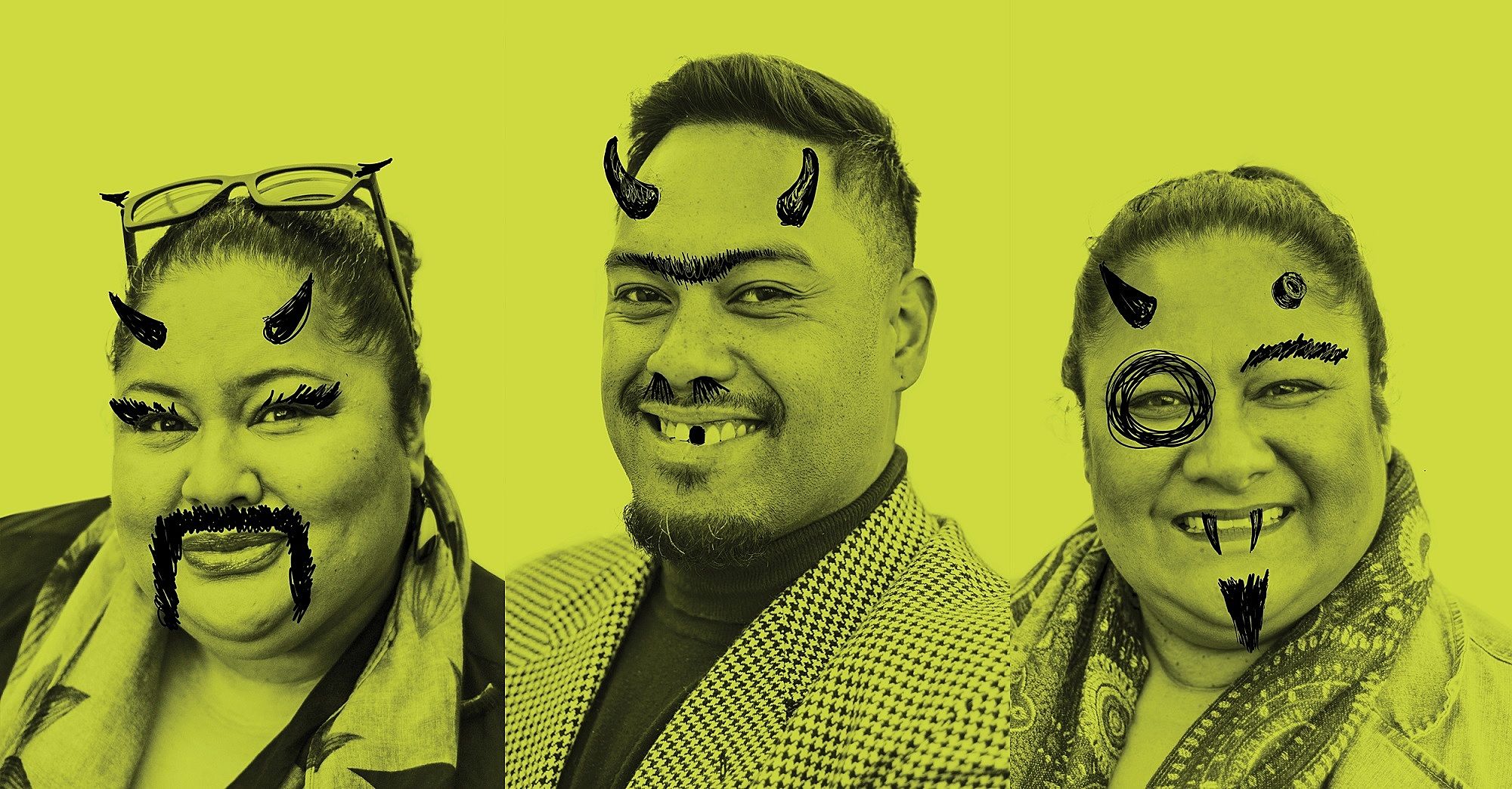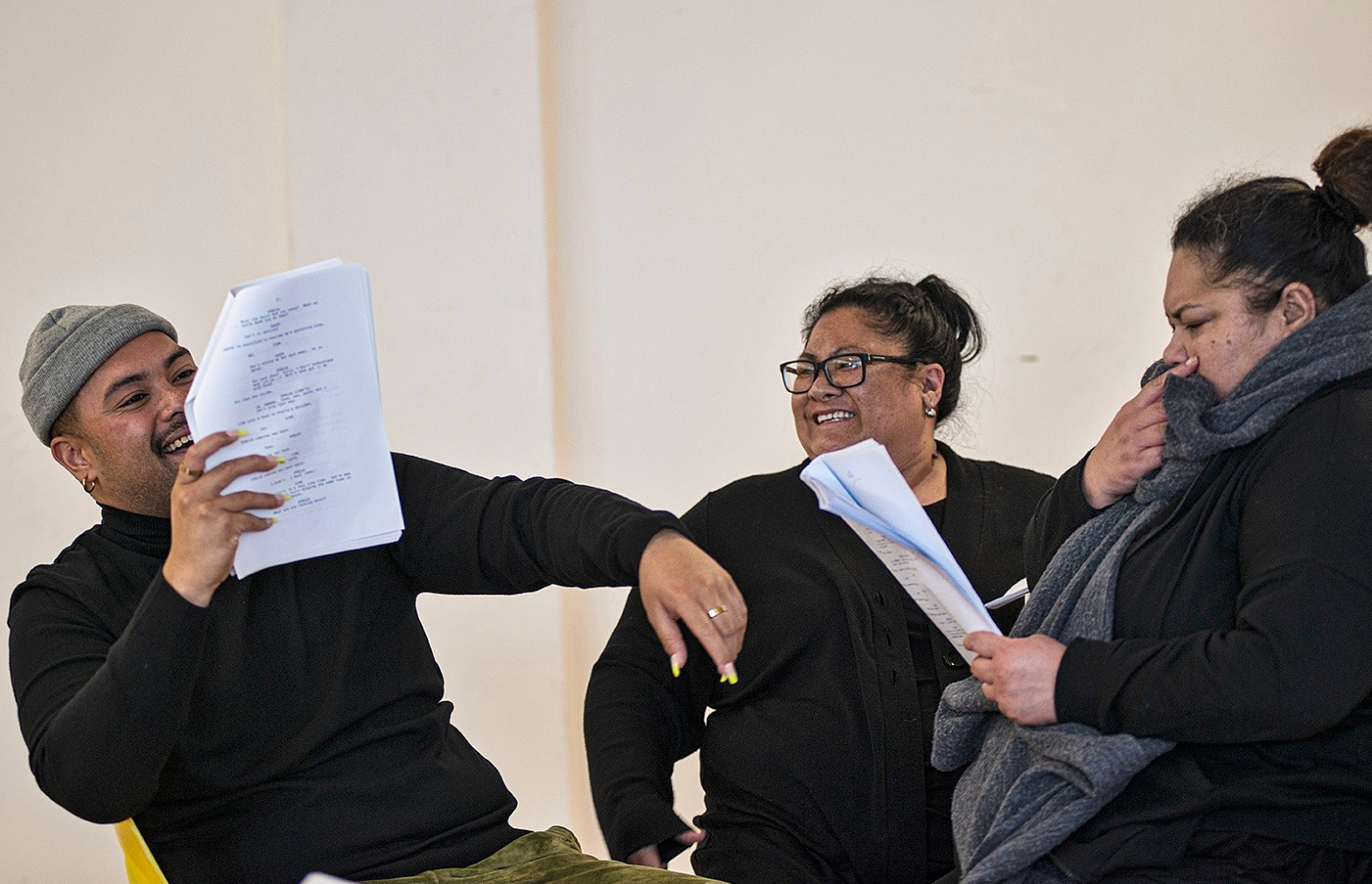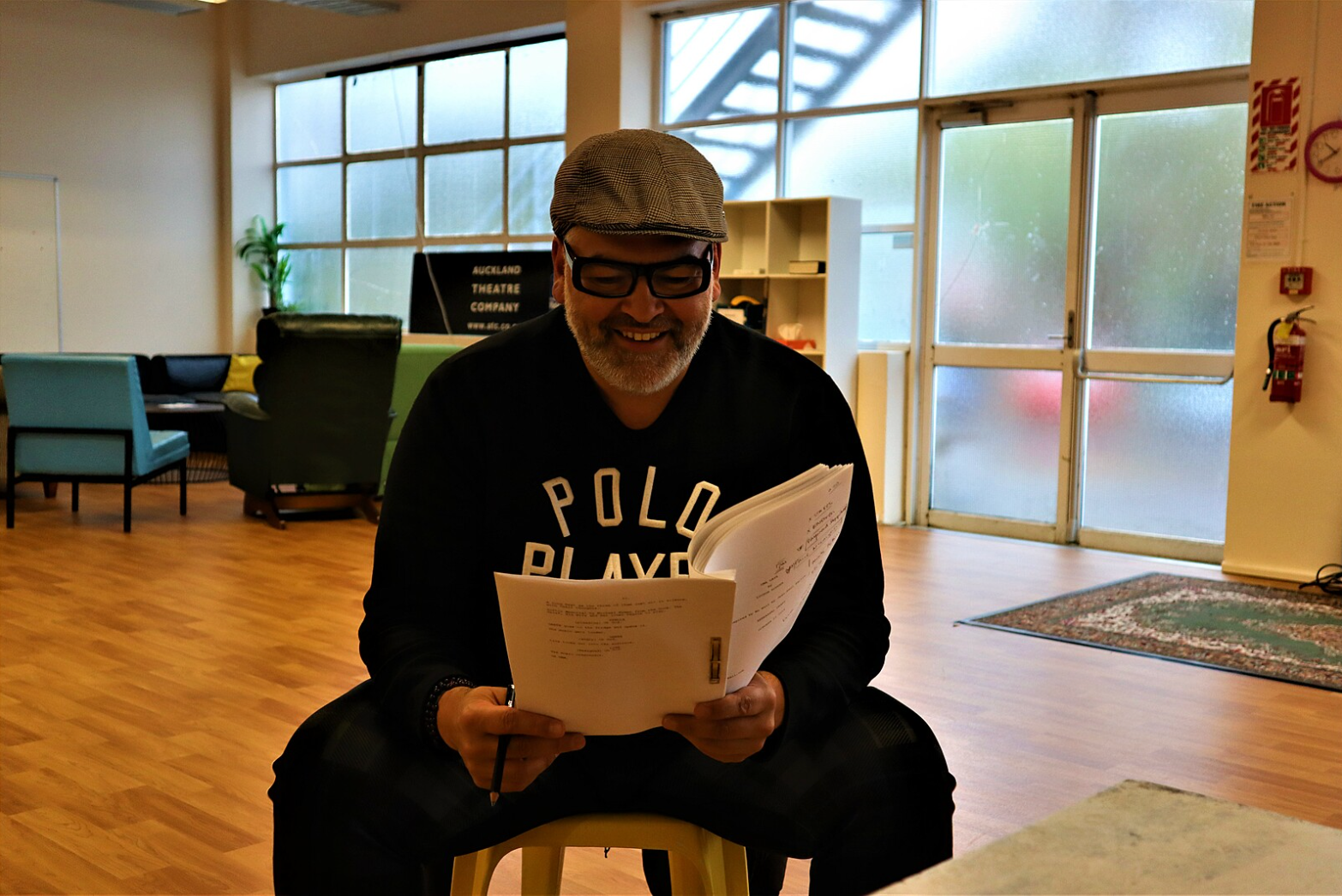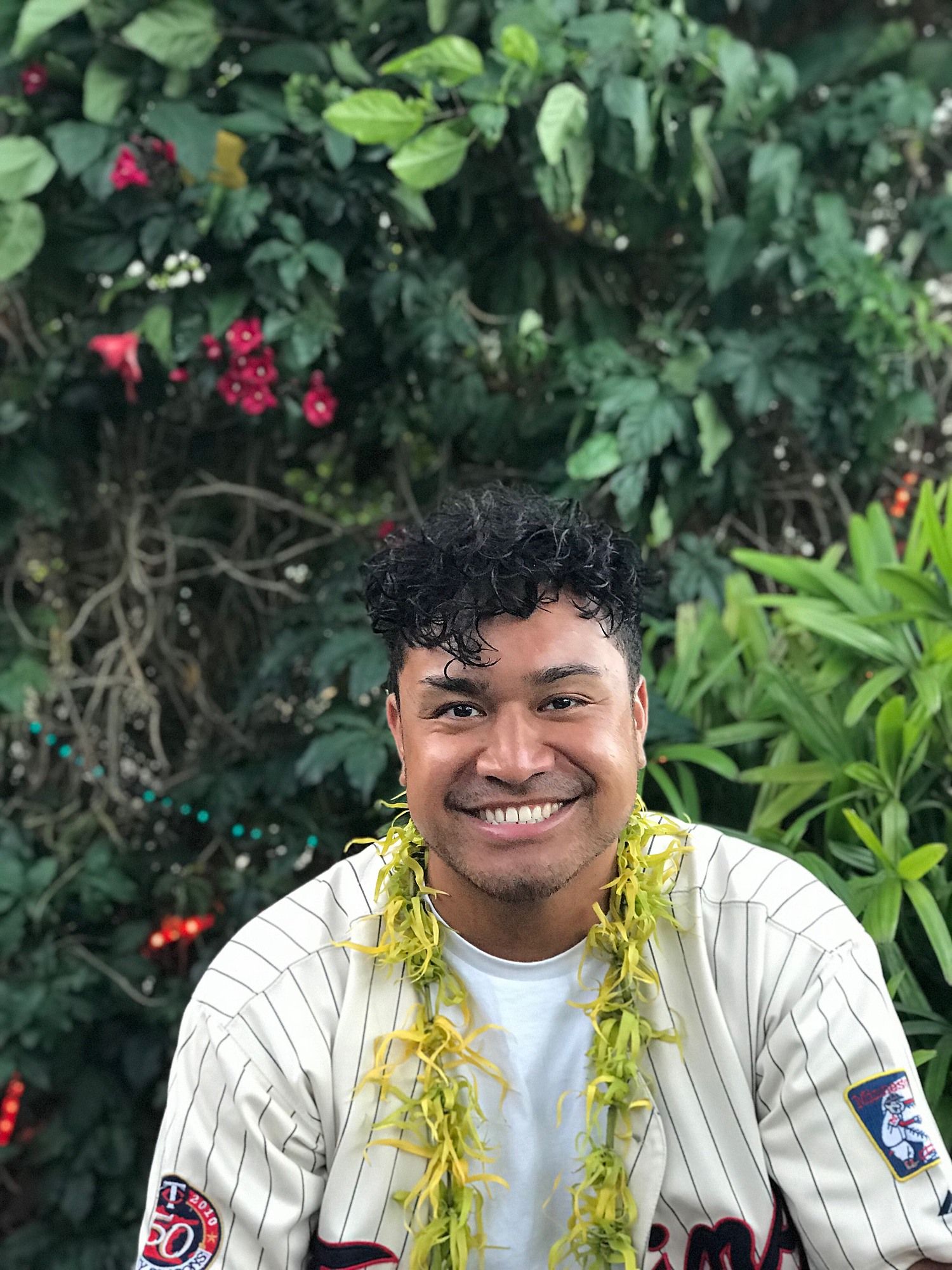Hell is Other People: A Review of Uma Lava
Is Hell other people, other Pacific people, or something different altogether? Sepe Mua’au considers Victor Rodger’s Uma Lava at Circa Theatre.
Is Hell other people, other Pacific people, or something different altogether? Sepe Mua’au considers Victor Rodger’s Uma Lava at Circa Theatre.
Entering Circa Two, we are met with a dark and dingy room lit almost exclusively by red fluorescent lights placed above and around the set; what used to be white walls now drip with mould and filth. A large tapa cloth, dimly lit, hangs stage right and next to that is a dirty off-white couch. There is a door centre-stage, a cardboard box in front of the door just left of centre stage covering a toilet, a small fridge behind that and a TV stage left, mounted to the wall.
Victor Rodger’s Uma Lava, directed by Vela Manusaute, takes the premise of Jean Paul Sartre’s No Exit – a play that places three incompatible characters together in a locked room in Hell – and adds a Sāmoan twist to the story and characters. Anapela Polataivao as academic Lina, Goretti Chadwick as Reverend Stella, and Mario Faumui as politician Garth navigate their new life in this literal hellhole and attempt to make sense of their lives and deaths, much to our entertainment, pleasure and often disgust. Paul McLaughlin, as T D, rounds out the stellar cast and brings with him a grounding presence and surprisingly Kiwi humour to the piece.
Towards the end of the original script of No Exit, character Joseph Garcin famously says “L’enfer, c’est les autres,” or “Hell is other people.” In the case of Uma Lava, Hell is being forced to live with people whom you fundamentally disagree with and are incapable of understanding.
The Circa website warning for Uma Lava reads, “This show contains material that hopefully offends most people,” and describes it as a “riotous, irreverent comedy of terrors where no sacred cow is left unslaughtered” which contains “strong language, sexual content, and blasphemy.” I can tell you right now, they did warn you. Uma Lava exceeds on all fronts, unapologetically, with pace and irreverence that is almost unforgivable (but never forgettable).
The set design is simple, functional and serves the events of the play well. I’ll be the first to say I am not a set designer, but given that the script is full of references to blood, fecal matter and disturbing content I think there was a missed opportunity to playfully explore that further through set design.
Enter our actors – whose work is Uma Lava’s strength: Anapela Polataivao and Goretti Chadwick are at their usual and scary best. Mario Faumui holds his own against these two powerhouses, which elevates the argumentative nature of the script to a higher level. There are already other reviews by Corey Spence of Art Murmurs and John Smythe of Theatreview, which articulate in detail the strengths of all these performances, and all which I wholeheartedly agree with. These guys act the hell out of this play.
Standout moments include Anapela and Mario’s hilarious constant bickering and “vocal war of fucks” – essentially each taking turns screaming “fuck” at each other (this happens more than once). Goretti’s constant switch in physicality is also a stand out; moments of sincerity are immediately contrasted with ridiculous melodrama, amplifying the comedy. Uma Lava’s strengths are in the fun, farce and genuine ridiculousness that occur repeatedly onstage.
If Sartre's play says that Hell is other people, Uma Lava presents Hell as other Pacific people and it’s easy to feel deflated seeing and hearing this story. I grew up in a Sāmoan church, constantly reminded of my sins, and of Hell, and of guilt. I realise now though that the church was a proxy for the village life my parents missed back home, that this New Zealand life was represented through plays and stories I grew up with and loved. But that those stories are not representations of all villages and all PI experiences. Uma Lava is a stark contrast to these stories.
As a New-Zealand born Sāmoan artist working in theatre, I appreciate so much seeing a piece of a Pacific artist’s work being shown in which characters aren’t typecast, are not written purely based on the colour of their skin or even their experiences as PI, but who are humans first, and ethnicity second – albeit, pretty poor excuses for humans (thanks Victor).
I see Uma Lava and I realise we don’t always need works that give us catharsis. Our scripts don’t always need to be hopeful and empowering. We don’t need to think this is the play that tells the story of the lives of all our people
I commend Victor’s writing, it is fast-paced, funny, a lot of it crass, and at times I find it crude for crude’s sake, but it makes sense. Why? It’s the way these characters were written, and hell it’s probably why they’re in Hell. They’re not heroes, they’re not stereotypes and they’re not godly representations of Pacific Islanders that much Pacific writing tends to illustrate.
Throughout the whole play I’m waiting to see a change in these flawed characters or feel compelled to care about them. When that doesn’t come to fruition, and I’m left with the feeling that it truly would be Hell to watch these three characters live out the rest of eternity in that room – I understand then that Victor has written them purposefully. Characters that defy Pacific stereotypes – I am so here for that.
Watching rehearsal videos and interviews with Anapela, Goretti and Mario, I see the laughter and love and overall positive experience during the creation process, and it is everything I live for as theatre maker. I see the photos from opening night, the smiles, I hear the laughter, praise and support from the Pacific community and I cannot stress enough how fucking cool it is to see a Circa show full of brown people where the show is just that, a show – without a major discussion about history, colour or colonisation. I read works from early-career playwrights that speak to those issues and I find empowerment.
I see Uma Lava and I realise we don’t always need works that give us catharsis. Our scripts don’t always need to be hopeful and empowering. We don’t need to think this is the play that tells the story of the lives of all our people – we have more stories and more opportunities to tell shit ones about shit people instead of moral works that make white people guilty and brown people a little less hopeless. It is a different kind of empowerment.
Does that make Uma Lava any less of a representation of PI life? Hell no! If anything it has given me an appreciation that my village is actually much more diverse than what I have grown up thinking. That our stories are far from being written. That these stories will continue to flower for generations to come. And that despite what it looks like, Hell isn’t other people. At least not in this village.
Thank you Uma Lava, Victor and the whole team.
Don’t just read this, go and see it for yourself. No regrets here. All alofa.
Circa Theatre’s Uma Lava runs from 23 November – 7 December 2019 at Circa Two. Tickets available here.



